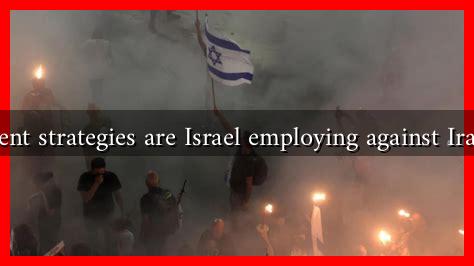-
Table of Contents
What Engagement Strategies is Israel Employing Against Iran’s Aggression?
Israel and Iran have been embroiled in a complex and often hostile relationship for decades. As Iran continues to expand its influence in the Middle East, Israel has developed a range of engagement strategies to counteract Iranian aggression. This article explores the multifaceted approaches Israel is employing, including military, diplomatic, and cyber strategies, to safeguard its national security and regional stability.
Military Strategies: A Show of Force
Israel’s military strategies against Iran’s aggression are characterized by a combination of deterrence and preemptive action. The Israeli Defense Forces (IDF) have been actively involved in operations aimed at curbing Iranian influence in neighboring countries, particularly in Syria and Lebanon.
- Airstrikes in Syria: Israel has conducted numerous airstrikes against Iranian military installations in Syria. These operations aim to prevent the transfer of advanced weaponry to Hezbollah, an Iranian-backed militant group.
. According to reports, Israel has carried out over 300 airstrikes in Syria since 2017.
- Targeting Nuclear Facilities: Israel has consistently expressed its concerns over Iran’s nuclear program. The Stuxnet cyberattack in 2010, which targeted Iran’s Natanz nuclear facility, is a prime example of Israel’s willingness to use unconventional methods to thwart Iranian ambitions.
- Military Alliances: Israel has strengthened its military alliances with countries like the United States and Gulf Arab states. Joint military exercises and intelligence sharing have enhanced Israel’s operational capabilities against Iranian threats.
Diplomatic Engagement: Building Alliances
In addition to military strategies, Israel has pursued diplomatic engagement to counter Iran’s influence. This approach involves forging alliances with other nations that share similar concerns about Iran’s regional ambitions.
- Normalization Agreements: The Abraham Accords, signed in 2020, marked a significant shift in Israel’s diplomatic landscape. By normalizing relations with the United Arab Emirates and Bahrain, Israel has created a united front against Iranian aggression.
- International Advocacy: Israel has actively lobbied for international sanctions against Iran, particularly in response to its nuclear program. The Israeli government has worked closely with the U.S. and European allies to ensure that Iran faces economic consequences for its actions.
- Engagement with Regional Powers: Israel has sought to engage with other regional powers, such as Saudi Arabia and Egypt, to create a coalition that can effectively counterbalance Iran’s influence in the Middle East.
Cyber Warfare: A New Front
Cyber warfare has emerged as a critical component of Israel’s engagement strategies against Iran. Israel is known for its advanced cyber capabilities, which it uses to disrupt Iranian operations and gather intelligence.
- Cyber Attacks: Israel has been implicated in several cyberattacks against Iranian infrastructure, including oil facilities and military installations. These attacks aim to undermine Iran’s operational capabilities without resorting to conventional military action.
- Intelligence Gathering: Israel’s cyber capabilities allow it to monitor Iranian activities closely. This intelligence is crucial for preemptive strikes and for informing international partners about potential threats.
- Defensive Cyber Measures: In addition to offensive operations, Israel invests heavily in defensive cyber measures to protect its own critical infrastructure from Iranian cyberattacks.
Conclusion: A Comprehensive Approach
Israel’s engagement strategies against Iran’s aggression are multifaceted, combining military, diplomatic, and cyber approaches. By conducting airstrikes, forging alliances, and employing cyber warfare, Israel aims to deter Iranian influence and protect its national security. The ongoing tensions between these two nations highlight the complexities of Middle Eastern geopolitics and the need for continued vigilance and strategic planning.
As the situation evolves, Israel’s ability to adapt its strategies will be crucial in maintaining stability in the region. The interplay of military might, diplomatic efforts, and cyber capabilities underscores the importance of a comprehensive approach in addressing the challenges posed by Iran.
For further reading on the geopolitical dynamics in the Middle East, you can explore resources from the C-SPAN.





